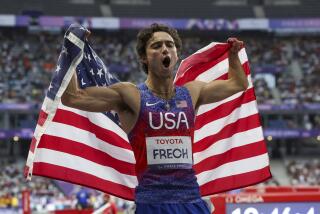U.S. Loses Its Timing
- Share via
PARK CITY, Utah — It figured that it would be all but impossible for the U.S. snowboard slalom racers to meet or better the standard set by the American halfpipe riders, who earlier this week won four Olympic medals, two of them gold.
And they didn’t.
In racing dominated by Europeans, only one American man, Chris Klug, and a sole American woman, Lisa Kosglow, advanced out of Thursday’s preliminary rounds to today’s parallel giant slalom finals. Four Austrians and three Swedes qualified on the men’s side; on the women’s, three from France, four from Italy.
Klug, 29, of Aspen, Colo., who only 18 months ago underwent a liver transplant, finished 11th Thursday; Kosglow, 28, of Boise, Idaho, who has an extensive injury history but remains such an aggressive rider she’s known as “Kozilla,” came in seventh. Both are making their second Olympic appearances; Klug finished sixth at the Nagano Games in 1998, Kosglow 27th.
Racing Thursday was against the clock--top 16 in, everyone else out. Today’s races will be head to head--two competitors racing against each other down the course, winner keeps going, loser is out, men against the other men, women versus women.
Gilles Jaquet of Switzerland, whose painted helmet features a surfer on one side and a bikini-clad woman face-down in the sand on the other, emerged as the favorite in the men’s event. He finished first Thursday, in 35.69 seconds. “I’m not one who can do a really safe run,” he said afterward.
Second, at 36.28, was Austria’s Alexander Maier, younger brother of Hermann--the Herminator, the fearsome skiing machine who dominated the Alpine events at Nagano. Older brother Hermann, injured and unable to compete at the Salt Lake Olympics, called younger brother Alex on Wednesday night with some tips. What were they? “I tell you after the race [today],” Alex said. “They are too strong.”
Third was Daniel Biveson of Sweden. In women’s racing, favorite Karine Ruby of France posted the second-best qualifying time, 41.45, just .01 of a second behind Maria Kirchgasser of Austria. Lidia Trettel of Italy came in third, at 41.94.
Thursday’s racing served primarily to thin the field--30 women and 32 men started Thursday--and to establish seedings for the finals. Just as in the early regional rounds of the NCAA basketball tournament, No. 1 will square off against No. 16, No. 2 against No. 15, and so on.
Kosglow, seeded seventh, has been sidelined over the years by a broken back, fractured pelvis, two broken elbows, smashed left foot joint, broken right ankle, broken right wrist and a torn anterior cruciate ligament in her knee.
She said of today’s racing, “My only plan is to have fun.”
Klug, cheered on Thursday by 57 family members and a pack of friends, arrived at the starting gate as one of the heartwarming stories of the Games. Virtually every major media outlet in the United States has done a story about how he was diagnosed with liver disease and needed a transplant.
The timing of the race couldn’t have been more appropriate. Thursday was not just Valentine’s Day, it was also National Donor Day, designed to raise awareness of the benefits of organ donation.
Klug took the opportunity to pay tribute to the family of the 13-year-old boy whose liver he received in a July 2000 operation; the boy had been shot in the head and left brain-dead by a 14-year-old neighbor in what was later described as an accident.
“I’m lucky to be here today,” Klug said after Thursday’s race, calling the donor family “the real heroes.”
Klug drew bib No. 1, meaning that he would be first down the course, and after a tentative start, he picked up speed and finished in 37.17. Then he had to wait to see if he would make the top 16, “having a little bit of a heart attack,” as he put it.
The other members of the U.S. men’s and women’s teams saw their Olympic dreams end in less than a minute. Jeff Greenwood and Peter Thorndike finished 20th and 27th, respectively. On the women’s side, Sondra Van Ert finished 17th, Rosey Fletcher 26th and Lisa Odynski 27th.
Van Ert, still racing at a world-class level at age 37, said afterward, “I sure wish I still got to play [today].”
Greenwood, meantime, acknowledged that the halfpipe team “was a tough act to follow.” He also said, “It did cross my mind: How are you going to follow that?”
More to Read
Go beyond the scoreboard
Get the latest on L.A.'s teams in the daily Sports Report newsletter.
You may occasionally receive promotional content from the Los Angeles Times.






